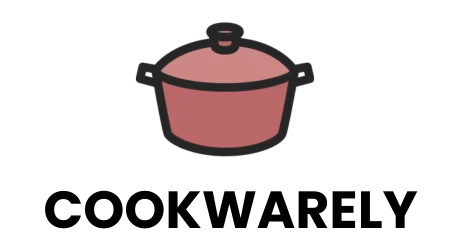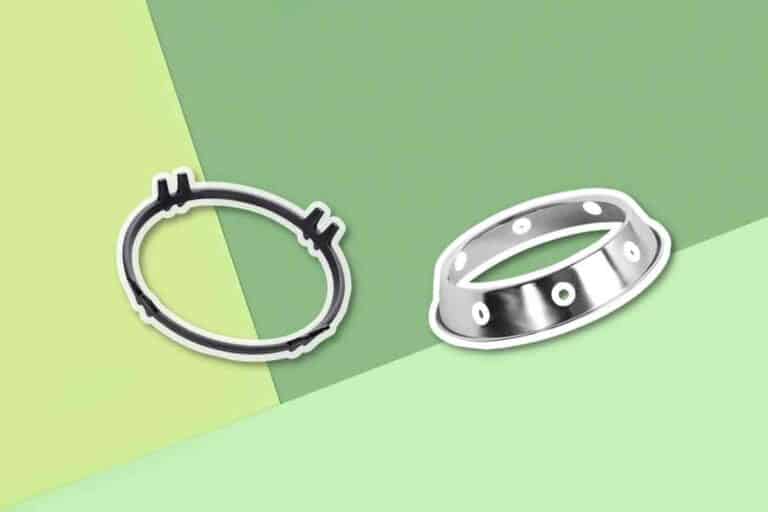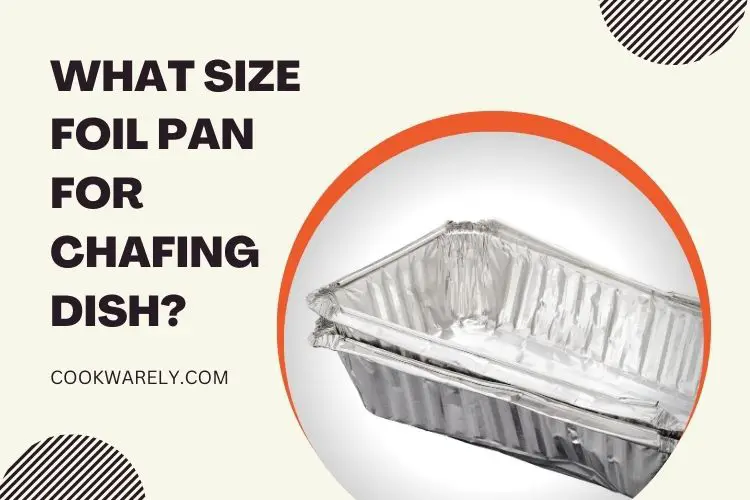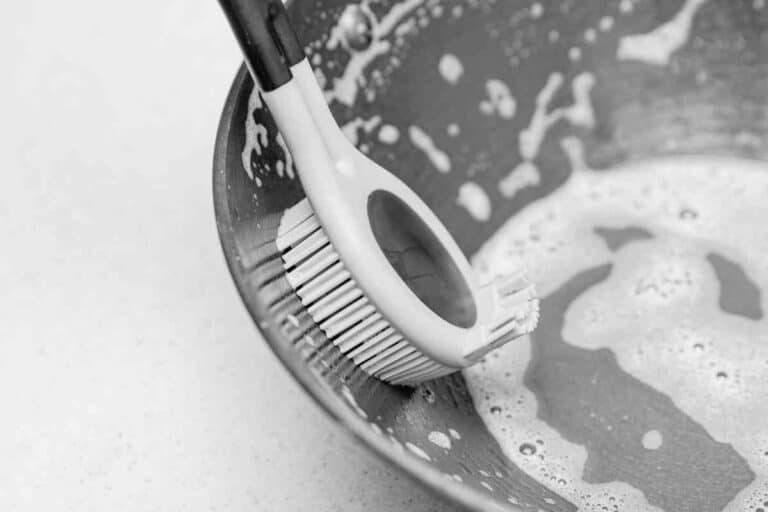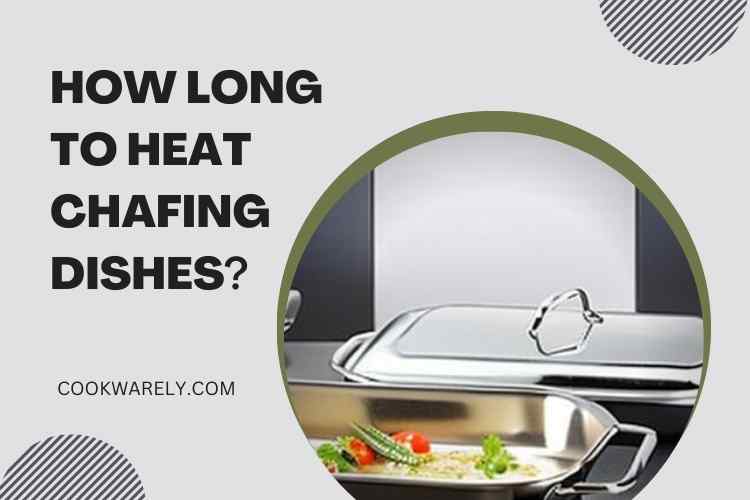Is Black Residue On Cast Iron Skillet Harmful?
Black residue on your cast iron skillet is a bit like the char on a grilled burger – it’s made up of carbon, burnt food, and grease.
Think of it as the battle scars from your culinary adventures. This residue tends to accumulate over time, especially if you’re not careful with your skillet.
Black residue on a cast iron skillet is not harmful to health. Composed of carbon, burnt food, and grease, it enhances non-stick properties. While it may affect food flavor and aesthetics, it poses no health risks. Proper cleaning and seasoning maintain skillet quality.
So, why does this black stuff appear? Well, it’s often caused by using oils with low smoke points at high temperatures.
When those oils get too hot, they break down and leave behind this black residue. Plus, if you’ve missed cleaning some food bits from your skillet, they can also contribute to the buildup.
8 Common Causes of Black Residue On Cast Iron Skillet
| Causes of Black Residue | Description |
|---|---|
| High Cooking Temperatures | Cooking at very high temperatures can cause oils and fats to break down, resulting in black residue. |
| Use of Low Smoke Point Oils | Oils with low smoke points, like olive oil, can easily reach their smoking point, leading to black residue. |
| Burnt Food Bits | Leftover food particles that get charred and stuck to the skillet can contribute to black residue buildup. |
| Inadequate Seasoning | A poorly seasoned cast iron skillet may lack a protective layer, making it more susceptible to residue. |
| Long-Term Storage Without Proper Care | Storing a skillet without proper cleaning, seasoning, or protection over time can result in black residue. |
| Excessive Oil or Grease | Accumulated excess oil or grease can carbonize and transform into black residue over an extended period. |
| Cooking Acidic Foods | Highly acidic foods like tomatoes or citrus can react with the skillet’s iron, causing dark stains/residue. |
| Infrequent Cleaning | Neglecting regular cleaning allows residue to accumulate and become more challenging to remove. |
Key Takeaways
- Black residue on cast iron skillets is not harmful to health.
- It contributes to non-stick properties, making cooking easier.
- It can affect food taste and appearance, so consider cleaning it.
- Proper care, cleaning, and seasoning preserve skillet quality.
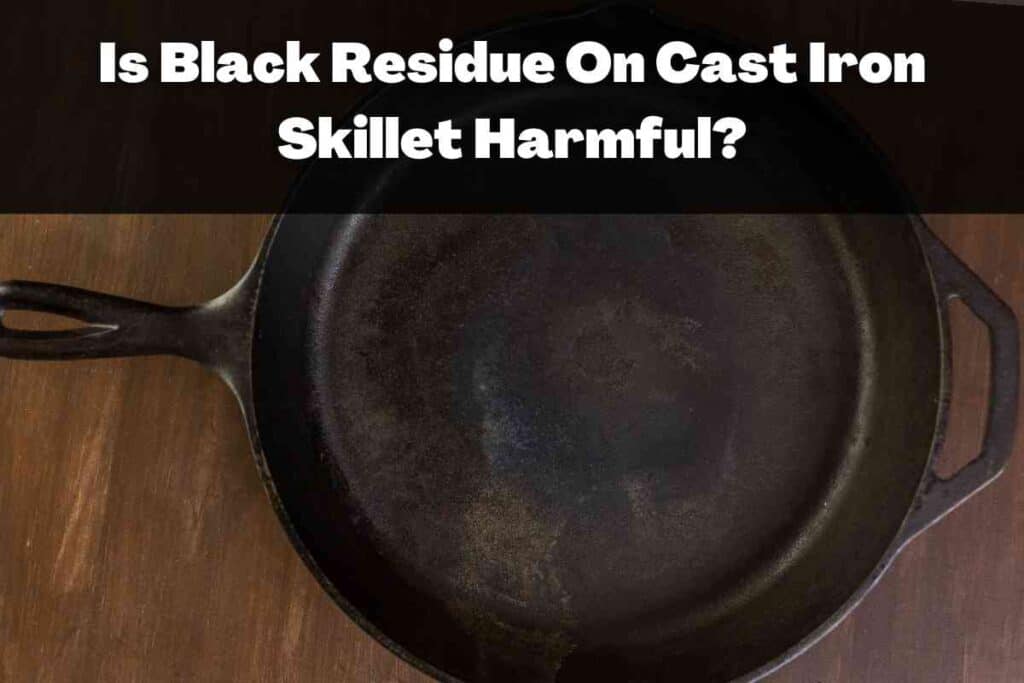
Five Facts About Black Residue on Cast Iron Skillet
- The black residue consists of carbon, burnt food, and grease.
- It forms due to high cooking temperatures and the use of low-smoke point oils.
- While it may affect food taste and appearance, it is generally not harmful to health.
- Regular cleaning and seasoning are essential for cast iron skillet maintenance.
- It can enhance the skillet’s non-stick properties, aiding in cooking.
Is Black Residue On Cast Iron Skillet Harmful?
The good news is that black residue on your cast iron skillet is generally not harmful to your health. It’s not something you need to lose sleep over. In fact, it can actually help in creating a non-stick surface, making your cooking adventures easier.
1. Non-Stick Properties
Speaking of non-stick surfaces, black residue can contribute to it. This means your pancakes will flip like a breeze, and your eggs won’t stick to the pan. It’s like a built-in non-stick coating, minus the chemicals you find in non-stick cookware.
2. Impact on Food
Okay, but does it affect the taste of your food? Well, it might. Black residue can sometimes give a slightly charred flavor to your dishes. It can also darken the appearance of your food, which might not be what you’re aiming for if you’re cooking something delicate.
3. Practical Considerations
From a practical standpoint, it can affect how your food cooks. If you have a lot of black residue, your skillet might not heat evenly, which can lead to uneven cooking. So, it’s not just about taste and looks; it’s about the quality of your meals.
What is the black stuff coming off cast iron?
The black stuff that comes off your cast iron skillet can be a problem. While dishwashers are ineffective at cleaning cast iron, soaking it in water can help remove the residue and keep it from rusting.
You can also use soap and a pan scraper to scrape any remaining food. If you can’t remove the stuck-on food, you can simmer it in water.
The residue is caused by the excess cooking oil and fat that has coated the pan. It is not toxic but can negatively affect the taste of your food.
The good news is that it’s quite easy to remove. Follow the steps below to remove the black stuff and keep your cast iron pan looking new.
First of all, it’s important to make sure that you don’t over-season your cast iron. Too much oil will make the surface sticky and hard to touch. Using a small amount of oil for your cast iron pan is recommended.
Make sure that the oil is just enough to coat the pan, then wipe away any excess with a paper towel. This way, the black stuff won’t stick to your skillet.
Can you get food poisoning from cast iron?
Is there any danger in eating food cooked in a cast iron skillet? Yes, if you don’t take proper precautions. In addition to cooking foods on a non-stick pan, you should wash your pan thoroughly to remove any residue.
After cooking, you should place the skillet in a dry cabinet and place paper towels between it and other pots and pans.
To clean a cast iron skillet, you can either use hot water or soap. However, never leave it soaked in soap for longer than is needed to clean food.
Soap can dry the skillet out, and this can cause rust to develop. If you want to make a cast iron skillet last longer, use a seasoned one.
Once the skillet has been properly seasoned, you can begin cooking in it again. Start by baking something in it, like steak or bacon, so that you can get a good foundation. You can use the skillet for cooking a number of different types of food.
How do I know if my cast iron pan is bad?
The black residue on a cast iron skillet is an accumulation of burned oil or food. It can also be the product of the manufacturer’s seasoning.
If this is the case, it needs to be removed. This will prevent buildup. If you see black residue, use water or a bristle brush to scrub off the residue.
The black residue on your cast iron skillet should be cleaned by placing it in a sink. Use a paper towel to dry it off.
If the residue is not completely gone, you can scrub it with salt. The salt you need to apply should be a quarter to half a cup.
Another option is to reseal the skillet after using it. Make sure to dry it completely before doing so.
Then, you can use any oil or shortening to reseal the pan. Remember that preventing black residue is much easier than removing it.
How to get the black residue off cast iron?
If you want to know how to clean black residue off cast iron skillet, there are two main ways to clean your cast iron skillet using a brush or to rub it with salt.
These methods will help keep your skillet clean and prevent black residue buildup.
Black residue results from burnt food, grease, or rust deposits. These can be difficult to remove.
If you are not using a wire brush, try the boiling water method. This method will loosen the black residue from your skillet and kill germs.
It will also clean the pan. You can also add a half cup of salt to the water and scrub the skillet’s surface.
While black residue on a cast iron skillet is not harmful, it can compromise the taste of your food. The buildup of carbon from cooked food and oils forms it.
If you are not careful, the buildup can become a problem in your cooking. While it’s not harmful, it is a sign that your skillet has not been properly seasoned.
How To Remove Black Residue On Cast Iron Skillet?
Safe Cleaning Methods
Now, if you want to bid farewell to the black residue, here’s how you can do it safely:
- Use of salt and scrubbing: Sprinkle some salt on your skillet and give it a good scrub with a brush. This method helps preserve the base layer of seasoning.
- Cast iron scrapers: These specially designed tools can be handy for stubborn residue.
- Avoiding soap or detergent: It’s best not to use soap or detergent regularly on your cast iron skillet, as it can strip away the seasoning.
Rust Prevention
Proper cleaning and seasoning are also key to preventing rust from forming on your cast iron skillet. After cleaning, make sure your skillet is thoroughly dry, and then apply a thin layer of oil to keep it well-seasoned.
Frequently Asked Questions (FAQs)
Before we wrap up, let’s tackle some common questions:
Can I Use Vinegar to Clean Black Buildup?
It’s best to avoid vinegar as it can damage your cast iron skillet. Stick to the salt method for black buildup.
How Do I Remove Gunk from My Skillet?
Wipe it down first, and then use a salt scrub to tackle the residue.
What If My Skillet Has Rust?
Scrub the rusty areas under hot water to remove rust flakes, dry them completely, and then re-season to prevent future rusting.
Conclusion
In the end, black residue on your cast iron skillet is more of a cooking companion than an enemy. It’s not harmful to your health, and it can even make your cooking experience better by providing a non-stick surface.
However, if it starts affecting the taste and appearance of your food, or if it hinders your cooking process, it’s a good idea to remove it using safe methods.
Remember to keep your cast iron skillet well-seasoned and properly cared for to enjoy its benefits for years to come.
